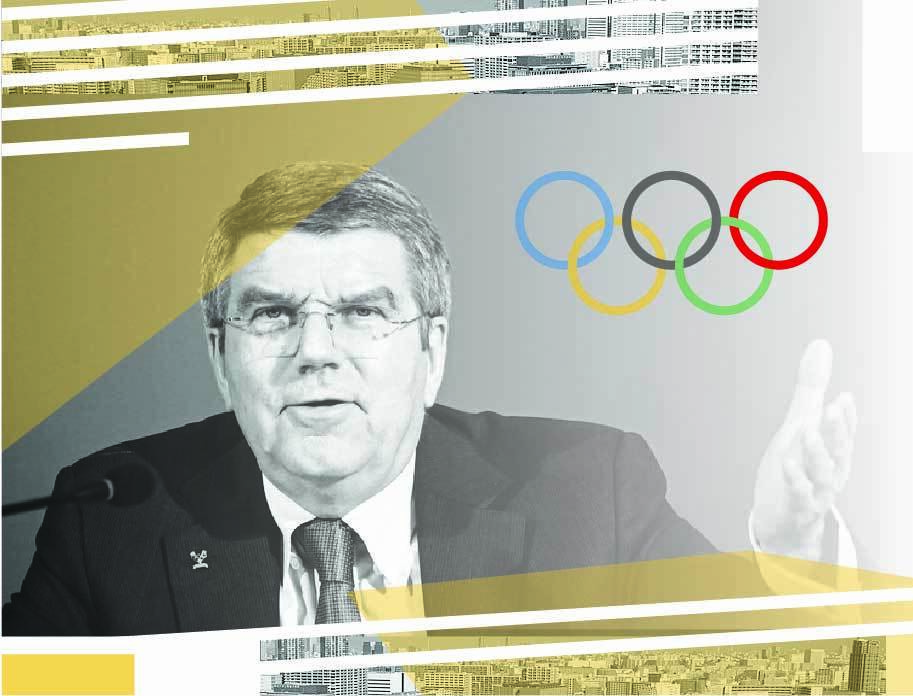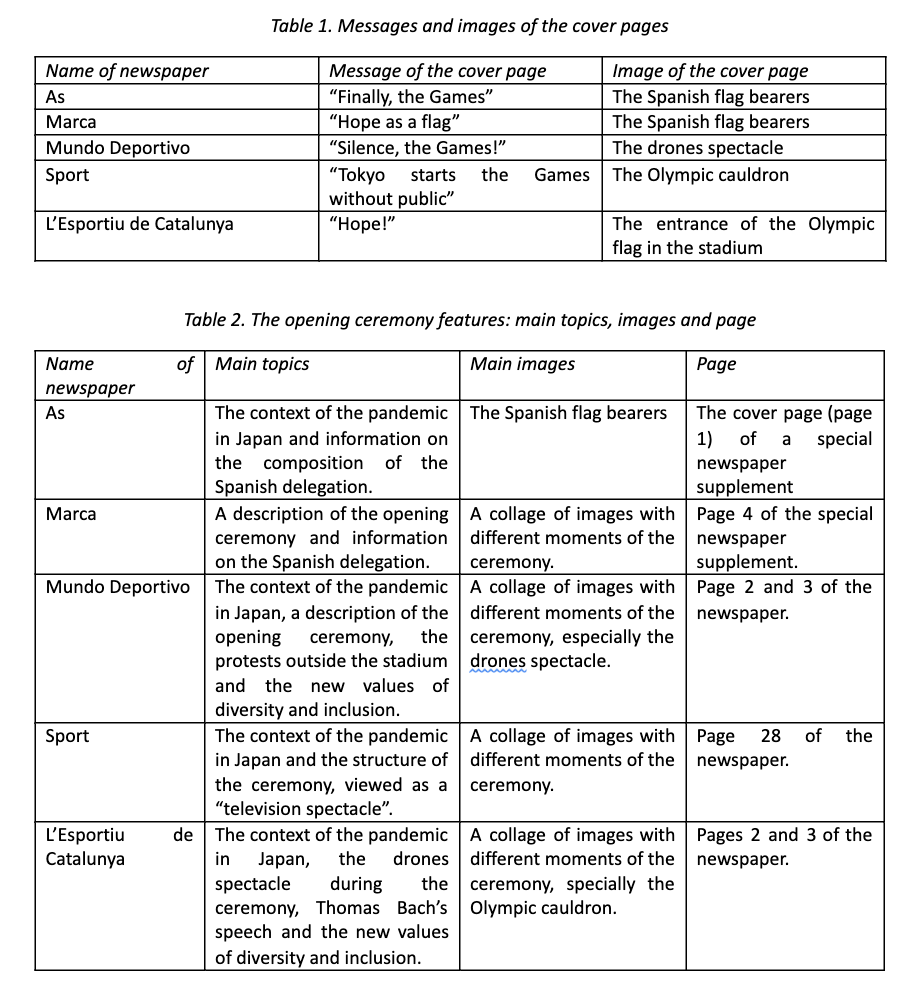
Dr Xavier Ginesta
Associate Professor at the University of Vic-Central University of Catalonia, Faculty of Business and Communication. He teaches Sport Marketing. He is member of the Sports Management Advisory Board at Widener University and member of the Board of Directors of the International Association of Communication and Sport.
Twitter: @xavierginesta

Section 2: Media Coverage & Representation
- Twitter conversations on Indian female athletes in Tokyo
- ”Unity in Diversity” – The varying media representations of female Olympic athletes
- The Olympic Channel: insights on its distinctive role in Tokyo 2020
- How do we truly interpret the Tokyo Olympic ratings?
- Between sexualization and de-sexualization: the representation of female athletes in Tokyo 2020
- Reshaping the Olympics media coverage through innovation
- What place is this? Tokyo’s made-for-television Olympics
- The paradox of the parade of nations: A South Korean network’s coverage of the opening ceremony at the 2020 Tokyo Olympics
- Tokyo 2021: the TV Olympics
- Why we need to see the “ugly” in women’s sports
- “The gender-equal games” vs “The IOC is failing black women”: narratives of progress and failure of the 2020 Tokyo Olympics
- Ghana: Poor local organizing, and absence of football team dampens interest
- Megan Rapinoe: The scary Bear for many Americans?
- ‘A Games like no other’: The demise of FTA live Olympic sport?
- Temporality of emotionalizing athletes
- Fandom and digital media during the Tokyo 2020 Olympic Games: A Brazilian perspective using @TimeBrasil Twitter data
- Media wins medal for coverage of athletes as people, instead of entertainers
- Media frames and the ‘humanity’ of athletes
- Reporting at a distance. Stricter working conditions and demands on sports journalists during the Olympics
- New Olympic sports: the mediatization of action sports through the Olympic Games 2020 Tokyo
- Simone Biles, journalistic authority, and the ideology of sports news
- Representations of gender in the live broadcast of the Tokyo Olympics
- Americans on ideological left more engaged in Summer Olympics
- Nigeria: Olympic Games a mystery for rural dwellers in Lagos
- National hierarchy in Israeli Olympic discourses
- Equestrian sports in media through hundred Olympic years. A roundtrip from focus to shade and back again?
- Reshaping the superhuman to the super ordinary: The Tokyo Paralympics in Australian broadcasting media
- Is the Paralympic Games a second-class event?
- The fleeting nature of an Olympic meme: Virality and IOC TV rights
- Tokyo 2020: A look through the screen of Brazilian television
- Is the Paralympic Games a second-class event?
- How digital content creators are shaping meanings about world class para-athletes
- How digital content creators are shaping meanings about world class para-athletes
- The male and female sports journalists divide on the Twittersphere during Tokyo 2020
- Super heroes among us: A brief discussion of using the superhero genre to promote Paralympic Games and athletes
- “Everything seemed very complicated”: Journalist experiences of covering the Tokyo 2020 Paralympic Games
- Representing high performance: Brazilian sports journalists and mass communication professionals discuss their philosophies on producing progressive Paralympic coverage
- Representations of gender in media coverage of the Tokyo 2020 Paralympic Games
Olympic media research on Communication and Sport has been very significant among scholars over the past two decades. As Andrea N. Geurin and Michael L. Naraine highlighted in an article published in Frontiers in Sports and Active Living, after examining 221 English-language articles published on this field, a “significant proportion of scholarship focused on the Summer Olympic Games, the United States, newspapers accounts of the Games, and utilized media framing and agenda setting frameworks and the content analysis methodology”.
However, due to the context in which the Tokyo 2020 Olympics have been celebrated, within the framework of the COVID-19 pandemic, these Summer Games can be a fantastic study object to deeply improve Olympic media studies topics and methods. As Arthur L. Caplan and Lee H. Igel suggested in Forbes some weeks before the Games started, Olympic media coverage would need to balance “the sport side and the public health particulars”.
In order to contrast this hypothesis, a content analysis of the cover pages and the main features of the opening ceremony, published in the mainstream Spanish and Catalan sport press (As, Marca, Mundo Deportivo, Sport, L’Esportiu de Catalunya) was conducted. Content analysis can help us to find primary new insights for future multidisciplinary and multiapproach research, as Guerin and Naraine defend in their article. Tables 1 and 2 show the initial results of this analysis.

Although since the foundation of the IOC, in 1894, the Games have been considered no place for politics, this has been more utopia than reality. Regarding media coverage, there are significant differences among the Spanish newspapers edited in Madrid (As and Marca) and Catalonia (Mundo Deportivo, Sport and L’Esportiu de Catalunya), above all in relation to the prominence given to the Spanish delegation and the Spanish bearers.
While Madrid newspapers situate the Spanish bearers on the cover page, and the composition of the national delegation is one of the central topics of the feature –representing a good example of what Michael Billig identified as “banal nationalism”–, the three newspapers edited in Catalonia (Barcelona and Girona) use other images of the ceremony to illustrate the beginning of the Games on the cover page, and the composition of the national team was blurred within the feature. For example, Mundo Deportivo and L’Esportiu de Catalunya also highlighted how the ceremony included elements to strengthen the values of diversity and inclusion, which have been included in the Tokyo 2020 Games Vision by IOC, and they also reported on the Japanese protesters against the Games outside the Olympic stadium.
However, the coronavirus pandemic and its impact on Japanese society became one of the main topics of every feature we analyzed. More important even than the words of Thomas Bach, president of the IOC, which only received significant attention in the feature published by L’Esportiu de Catalunya. Accordingly, we should imagine that the COVID-19 pandemic might not help Japan to strengthen its country brand during and after the Games, as China did in 2008, or Qatar expects to do in 2022 hosting the FIFA World Cup.
As the primary results of this content analysis suggest, adopting a geopolitical perspective can enrich the analysis of sport media narratives. The geopolitical multiapproach analysis allows researchers to consider all those aspects of the Games that impact on the social, political and economic systems, drawing the main synergies among them and adopting a critical point of view that breaks the traditional and non-real “sport and politics Olympic utopia”.

